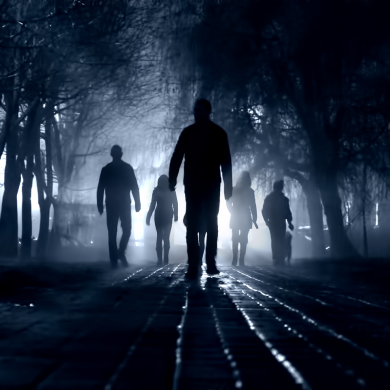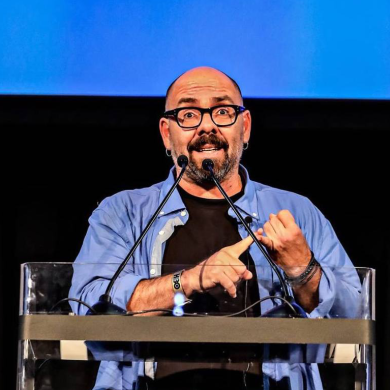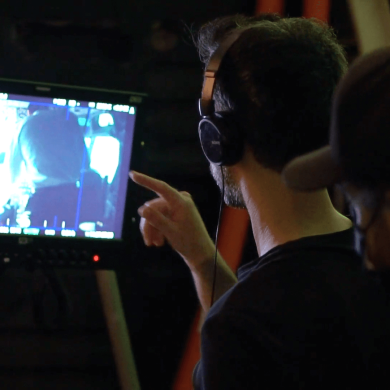By Justin Sanders
The rarest job in Hollywood is headquartered in an unassuming prefabricated trailer on the CBS backlot.
It is here where Eric Mills navigates a deluge of spreadsheets and databases as part of his daily quest to provide contestants with their winnings on one of the world’s most popular game shows, The Price is Right.
“There is only one other supervising prize producer in town, and she works for our sister show, Let’s Make a Deal,” Mills told CreativeFuture. “But it’s not the same job. It’s different there.”
On most game shows, Let’s Make a Deal included, cash and prizes exist to raise the stakes of the main action. We watch Wheel of Fortune to solve word puzzles. We watch Jeopardy to see how many trivia questions we can answer. These games would be fun to play with or without the prizes, though the rewards certainly make things more exciting.
On Price is Right, however, the prizes are the main action. The show is structured on a series of different games (77 to be exact) that offer a seemingly endless variation on one, unchanging goal: Name the price, win the prize. As funny and charming as host Drew Carey is, the show would literally be nothing without the prizes, which gives Mills’ role the distinction of being as important to the logistical side of things as it is to the creative. From appliances to fabulous cars, to exotic vacations in the South Pacific, he and his team plan, coordinate, purchase, and cajole thousands of prizes across nearly 200 episodes of television per season, painstakingly crafting the backbone of the most watched show on daytime television.
“The numbers are staggering,” Mills said, sitting in his office following a morning taping of The Price is Right. Flowcharts and calendars lined the room’s beige walls and just outside the door, workers laughed quietly in the kitchenette. The vibe felt almost sleepy following the manic energy of the taping, where the crowd had screamed relentlessly for over an hour, and dazzling colors blasted from every angle. But Mills’ eyes lit up just as brightly as he talked about the inner workings of his singular line of work.
“There is a fun balance on this job of very techy accounting and systems, but also the very creative process of building the shows and making the prizes fun and exciting,” he said. “You’re trying to tell a story with the prizes.
Eric Mills, the Supervising Prize Producer, on the set of The Price is Right.
JUSTIN SANDERS: What were you doing while the show was actually taping just now?
ERIC MILLS: I was back in my office, prepping for next week’s shows, but I’m always on standby, watching.
JS: Watching for what?
EM: For example, a game broke at today’s taping and we had to switch it out.
JS: Oh, I didn’t notice that.
EM: Yeah, sometimes these games are finicky. They tested it before it came out, did the math on a big LCD screen, and it wasn’t working, so somebody had to scramble to get another game ready. We have some games on standby, but somebody had to make that decision. They have to make sure all the graphics and everything are ready, and make sure the prizing is good. Every minute that we run long puts us at risk of losing the momentum and enthusiasm of the crowd.
JS: I’m fascinated to hear about the skillset one needs to do what you do. Take us down the path that led you to the exceedingly rare job of supervising prize producer.
EM: I studied mechanical engineering at Washington University (in St. Louis) and did internships in manufacturing and logistics. Once out of school, I started working for IBM in logistics consulting in Chicago. I enjoyed it but it was never a passion.
Another guy I worked with was really into film and we convinced the partner of our practice to give us money to make a short film for the annual team outing. So, we made a movie for 100 people in our practice, and we did that three years in a row. They were all spoofs on what we did in logistics, so instead of A Few Good Men, it was A Few Good Warehouses. Really bad, but it was just fun to do it.
By the third year, I realized that [making the annual film] was my favorite part of the job, and that maybe it was time to look into doing this full-time. I started taking production management extension classes at Columbia College in Chicago and talking to people out in Los Angeles. Everyone said, “You have to be in L.A.,” so I saved up for about a year, quit my consulting job in November of 2003, and moved out here that December.
I knew that I wanted to do something creative, but I didn’t necessarily want to be a writer. Through a friend working in game shows, I got hired to be an assistant to the executive producers on Deal or No Deal. I started working on that and then got into reality television. I got my first associate producer job working on National Lampoon’s Greek Games.
Then I got into a stretch where I was working for the production company 51 Minds, doing a lot of train-wreck reality shows like Flavor of Love and The Surreal Life. I would help come up with challenges for the participants and it really took a toll. At the end of the day, you’re trying to bring out the worst in people in a lot of those shows and I needed to do something different. I started working for a professional video game league show called Championship Gaming Series. It was owned by DirecTV and it was fantastic. We would produce a show like a live sporting event, making these 19-year-old gamers look really cool. It was really done well and was so much fun, but they were probably about five years ahead of their time, before professional gaming really started taking off, and they burned through all the money. But I loved the gaming aspect, how positive it was.
I got connected with a friend of mine at [Price is Right’s production company] FremantleMedia who was doing a lot of work with Mike Richards, who is now executive producer for The Price is Right. Mike needed an executive to run his development slate. He liked that I had a game background, but also had worked on other reality programming outside of game shows.
We had two shows in network development and the plan was for me to roll off into production on one of those – and they both died. But the timing was perfect because one of the longtime producers on Price said she wasn’t coming back for the next season, so we were able to roll me onto Price is Right. I shadowed her for a couple months and learned how to be a prize producer.
JS: And so, what did you learn? How does one be a prize producer?
At first, I had no idea what a prize producer was. Most people think prize producers are trade-out producers – people who get free prizes for the show through brand placements, sponsorships, etc. That’s not me. They needed somebody who could learn that world but also help elevate the prizing, get better stuff, and also make the games more exciting with better prizing.
And so, I did – I figured it out, but then a year after I started we did a big restructure of the show. Coming into Season 44, I went from being the solo prize producer to overseeing the entire prize department, which is a team of 16 employees, as well as all prize responsibilities, including trade-outs, prize coordination, the warehouse spaces, and fulfilment – which is a monster part of the show.
JS: Why is fulfillment such a monster part of the show?
EM: Just making sure people get their prizes is monstrous. We do 190 shows a season. Nine contestants get called on down during the course of a show – six actually get onstage. Either way, you win a consolation prize. Plus, there is always an additional contestant who is the raffle winner [Editor’s note: The raffle occurs at the end of each episode taping, and is not televised.] It all adds up to 1900 people per season winning at least something.
Last season, 260 cars were won – we purchase the majority of the cars we give out and we have to work each one out with the car dealership. We give out over 350 trips, which we have to work out with a travel agency. If a contestant wins a blender, somebody has to order that blender. The numbers are staggering.
JS: In researching this interview, I learned that winners who live outside of California have to pay 7% in taxes before they can even collect their prize. Do they ever balk at that figure?
EM: Yeah, they do. It’s tough sometimes – you win a $30,000 car, you have to come up with $2,100 in cash. If you’re planning on selling that car, you can probably work out an arrangement with someone, but if you want to keep that car, you have to come up with that money. Contestants will forfeit sometimes because they don’t want to pay the taxes. We don’t want people to forfeit.
People hate the taxes. We hate the taxes, too. We don’t want you to have to pay. We want you to be able to enjoy your prize.
JS: How do you go about planning and finding the prizes for each show?
EM: A show really begins about two months ahead of its tape date. We look at shows by air week. We want variety within each week. Our first-level pass is just, “Let’s build a week of shows by category. Let’s make a good [prize] spread. How many barbecues do we have in the week? How many cameras do we have? Jewelry?” I’ll try to mix it up. If I’m playing a barbecue grill, I’ll do a grill with a patio set, and later a grill with other accessories so you’re not getting the same price every time. It kind of leaves a bit of a mystery.
I like to make sure there is some designer brand in every show. Kate Spade. Prada. There is typically a television in every show, and a computer. There are always two cars. I work with that structure and start filling in the blanks. If we’re going to Hawaii in the Showcase, I don’t want a beach trip necessarily in the body of the show. It’s this chess match of trying to fill in all the slots for each show.
Once I’ve built a full week of shows, we have a meeting in a room full of people – both show producers, the director, the executive producer, co-executive producer, one of our associate producers, and I’m in there as well – and we just go through the week of shows. “Is this exciting? Does this feel too macho?”
Our audience is primarily female and by default, we want the variation of prizes to skew toward women. So, if you’ve got an Xbox, a home theater, a motorcycle, and tools all in the first half, that’s a little too much. Instead of the motorcycle, we might want to open up the show with, say, a closet full of designer clothing.
We call this stage of the process “beating the week.” It actually came from [host] Drew Carey, who comes from the sitcom world, where writers “beat out” an episode.
JS: Do you work with Drew Carey much?
EM: Drew is the one guy I don’t work with because I’m always at rehearsal and he’s not.
JS: He doesn’t come to rehearsal?
EM: Drew doesn’t see anything until he comes up on stage for the actual taping because you don’t want him to have any tell. The good side of that is, Drew is playing right along with the contestants.
JS: Do you wish you could be there at the actual tapings more?
EM: One thing that’s been the biggest bummer for me in this role is that I’m not onstage during the taping – because I want to hear the crowd’s reaction. When we put out a great prize, you feel the energy in the audience. When they go quiet it’s a bummer. I’ll think, “That was such a great prize and nobody was into it.”
JS; What kinds of prizes get the best responses?
EM: Cars and cash are the favorites, but trips always play well. Sometimes destinations don’t play well because people don’t know where it is. Designer brands are hit and miss – mostly positive, but sometimes people don’t know high-end brands – like Chloé. Our current EP was the first person to push designer. People were concerned that contestants wouldn’t be able to bid on it, and he said, “You know what? They’ll learn.” And they have. We’ve been seeing this season that contestants know that Tory Burch is more expensive than Kate Spade. The more we play it, the more people know.
We’re also trying to target a younger audience, and they want more “experiences,” where you’re not just getting a home office, but a home office with a photo studio and photo lessons. Or, instead of an ATV, let’s give you an ATV, camping gear, a gift certificate to REI, and a National Parks pass. Let’s make it a whole experience.
JS: The work you do is so much more logistical than I ever imagined, but does it also scratch that creative itch you had back in the beginning, when you were producing silly short films for fun?
EM: Yeah. I work very closely with the show producers. There is a fun balance on this job of very techy accounting and systems, but also the very creative process of building the shows and making the prizing fun and exciting. You’re trying to tell a story with the prizes.
JS: Given how long The Price is Right has been running, it’s amazing how fresh and lively it still feels both on and off the stage.
EM: We’re the No.1 show in daytime with an audience of 5.9 million people. We’re huge and yet we’re still pushing to make the show better year after year. We’re 46 seasons in and it’s like we’re still in the startup phase.
PHOTO CREDITS
Header photo courtesy of CBS. All other photos courtesy of Eric Mills.







